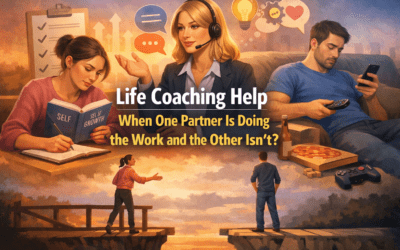What Creates Love Compatibility and Incompatibility?
Most relationship therapists’ focus on helping couples, caught in destructive power struggles and fighting patterns, learn how to negotiate and improve their communication skills.
 It rarely works and here is why…
It rarely works and here is why…
According to Dr. Sue Johnson, who wrote the book, “Hold Me Tight” they are missing the boat.
The real core problem couples face is not communication, but that they have disconnected emotionally.
They don’t feel safe with each other.
Underneath all the fighting, what partners are really asking each other is:
“Can I count on you, depend on you?”
“Will you there for me?””
Will you respond to me when I need, when I call?”
“Do I matter to you? Am I valued and accepted by you?”
“Do you need me, rely on me?””
All the anger, the criticism, the demands are really cries to stir their hearts, to draw them back emotionally and reestablish a safe connection.
That was mind blowing to me and really hit home.
Primal Panic
Attachment theory explains that our loved one is our shelter in life.
 When that person is emotionally unavailable or unresponsive, we unconsciously fear being out in the cold, alone and helpless.
When that person is emotionally unavailable or unresponsive, we unconsciously fear being out in the cold, alone and helpless.
We are rushed with emotions – anger, sadness, hurt and above all fear.
Losing the connections with our loved one jeopardizes our sense of security.
An alarm goes off in our brain’s amygdala or fear center.
I know we all have experienced some fear when we have disagreements or arguments with our partners.
But for those of us with secure bonds it is just a momentary blip. The fear is quickly and easily dismissed, when we realize there is no real threat or our partner reassures us.
Fear Of Losing Connection
For those of us with the weaker bonds, however, the fear can be overwhelming. We are overwhelmed by what’s called Primal Panic.
Then we generally either become demanding and clingy in our effort to draw comfort and reassurance from our partner or we withdraw and detach in attempt to withdraw and protect ourselves.
What we are really saying is: “Notice me. Be with me. I need you.”
Or,” I won’t let you hurt me. I will back off to try to stay in control.”
These strategies for dealing with fear of losing connection are unconscious, and they may work in the beginning.
But eventually it sets up a vicious cycle of insecurity that only pushes couples further and further apart.
The more interactions that happen, in which neither partner feels safe, then both become defensive and assume the worst about each other and their relationship.
Why We Don’t Respond With Love?
You may be wondering like I did, if we love someone, why don’t we honor our partner’s calls for attention and connection and respond with caring?
Unfortunately, because much of the time we are not tuned into our partners.
We are distracted by our own agendas.
We do not give clear messages about what we need or how much we care.
We send out calls for connection tinged with anger and frustration, because we do not feel confident and safe in our relationships.
We only give disguised and distorted messages from the fear of being exposed for our deep longing for attachment.
But that also makes it harder for our partners to understand and respond positively.
We wind up demanding, instead of requesting, which understandably leads to power struggles rather than embraces.
The Protest Polka
Dr. Johnson identified three damaging patterns in couple’s interactions. The most dominant one she calls the Protest Polka.
In this pattern, one partner becomes critical and aggressive, while the other becomes defensive and distant.
Psychologist John Gottman found that couples who gets stuck in this pattern, in the first few years of marriage, have an 80% chance of divorcing within four or five years.
In the Protest Polka, an argument could sound like this…
“How come you’re always late?”
“Doesn’t it matter to you that we have a date? I’m always waiting for you and you always let me down!”
And the other partner responds coolly…
“I got held up. But if you’re going to start nagging again, maybe we should just go home and forget the date.”
Endless Fights
 In this never-ending dispute, the couple gets caught up in the content of their fights.
In this never-ending dispute, the couple gets caught up in the content of their fights.
They focus on whose story is more accurate and who is most at fault.
They are convinced that the problem has to be either one person’s irresponsibility or at the person’s nagging.
Actually, the “what” of any fight doesn’t really matter.
When couples are in this pattern, their entire relationship becomes marked by resentment, caution and distance. They will see every difference, every disagreement through a negative filter.
It turns into “we don’t talk” and “we don’t have sex.”
Summed up perfectly by the title of a Notorious Cherry Bombs song, “It’s hard to kiss the lips at night that chew your ass out all day long.“
Angry And Frustrated
Angry and frustrated, they look for explanations or guidance.
 And come to the conclusion, their partner is callous and cruel.
And come to the conclusion, their partner is callous and cruel.
Or they turn the blame on themselves. “Maybe there’s something deeply wrong with me. I’m too difficult to love.”
Most relationship therapists see conflict and couple’s power struggles as the main problem in their relationships.
So they focus on teaching negotiation and communication skills to contain the conflict.
Attachment Panic
But according to Dr. Johnson this does not address the real issue of attachment panic.
The demand – withdraw pattern in this type of relationship is not just a bad communication styles.
It reflects a deeper underlying reality: these couples are starving emotionally…
They are losing the source of their emotional sustenance.
They feel deprived.
They are desperate to regain that nurturance.
Standard Techniques Don’t Work
Until the fundamental need for connection and the fear of losing it is addressed, the standard problem solving, better communication skills or taking time outs won’t work!
 Happy couples do you not talk to each other in any more “skilled” or “insightful” way then unhappy couples.
Happy couples do you not talk to each other in any more “skilled” or “insightful” way then unhappy couples.
It comes down to if they still feel connected, when the emotional tsunami hits.
The techniques most couples are taught, may stop a fight, but at a terrible cost.
Often it create further the distance and reinforces the fear of being rejected and abandoned.
At the critical time, when couples really just need to reaffirm their emotional bonds.
I found this fascinating and entirely true in my relationships. What about you? Please share your experience in the comments below…
Click here to read the next article in the series about love attachment.






Recent Comments